In this article:
Cough is a common reflex, and it is the body’s mechanism to clear the airways of irritants. Cough may be acute, lasting less than three weeks, or chronic, lasting for more than eight weeks. (1)
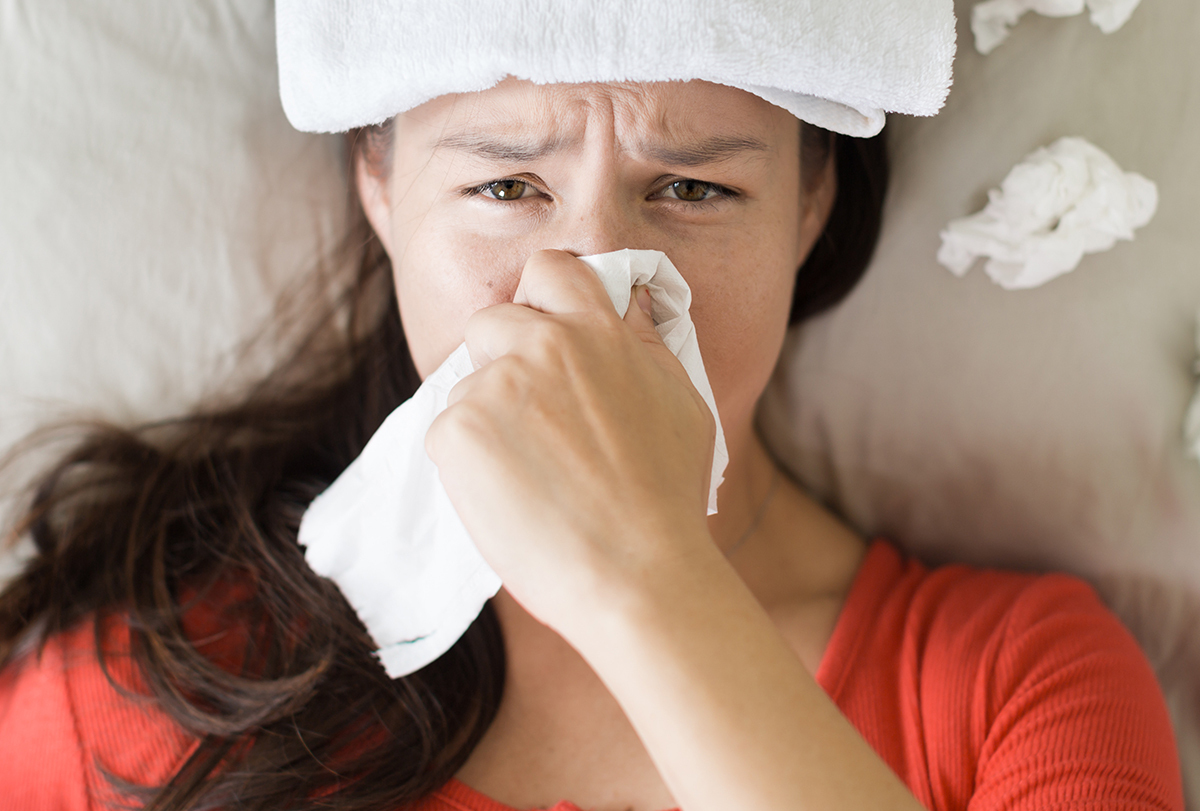
There are different types of cough: dry, wet, or whooping. The treatment for cough, of course, depends on its nature and causes.
A wet or productive cough, i.e., cough that produces phlegm, indicates that your body is producing more mucus than normal. (2)
Causes and Symptoms of Wet Cough
Acute cough in adults most often occurs because of infections caused by microorganisms such as bacteria or viruses, like those that cause a cold or flu.
Other reasons why your body may produce more mucus than usual may include different health problems such as bronchitis, pneumonia, chronic obstructive pulmonary disease (COPD), cystic fibrosis, and asthma.
In a toddler or baby, a cough is most often caused by a viral infection or asthma. A wet cough in children may also be caused by inhaling a foreign body (e.g. peanuts!), cigarette smoke, or other environmental irritants. (3)
A cough often begins with a dry hacking cough that causes heaviness in the chest and ultimately leads to coughing up phlegm as the illness progresses. It may feel like you have something stuck in your chest or a tickle at the back of your throat.
For immediate relief from chest congestion, Dr. Janette Nesheiwat, MD. has some pointers that would help you, which include, “stay hydrated, use a humidifier or take a hot shower-the steam mist will help, hot tea (adults can add honey), apple cider vinegar can help break up & loosen mucous/phlegm (mix it in water), a warm compress on the chest can help soothe symptoms.”
Other signs and symptoms that can be associated with cough are a rattling or whistling sound when breathing in or coughing (wheezing), breathlessness, chest pain or tightness, and fever.
A cough may follow a sore throat or a cold, and can be worse in the morning. It can affect your work and sleep, and it can disturb others around you, too.
Natural Remedies to Deal With Wet Cough at Home
Here are some home remedies for a wet cough.
1. Gargle with salt water
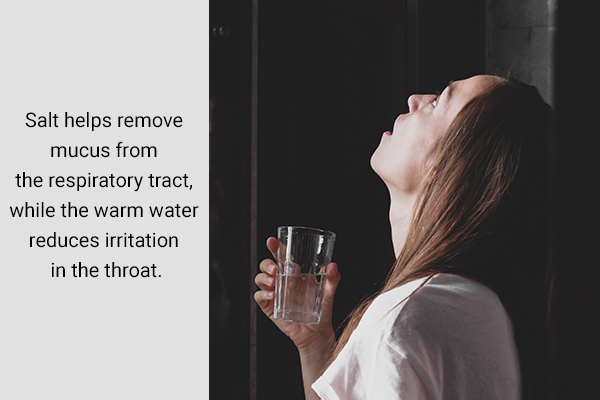
Gargling with salt water several times a day provides significant relief from cough. Salt helps remove mucus from the respiratory tract, (4) while the warm water reduces irritation in the throat.
Plus, the antiseptic property of salt may help fight any infection that may have caused the illness.
How to do:
- Add ¼–½ teaspoon of salt to a glass of warm water.
- Mix well until the salt is thoroughly dissolved.
- Gargle with this 2–3 times daily until your congestion clears.
2. Steam inhalation can provide relief
Inhaling steam is another effective way to get quick relief from a cough. The heat and moisture from the steam helps break up and dissolve mucus. Moreover, inhaling steam infused with tulsi leaves extract can help relieve cough and cold even better. (5)
How to do:
- Fill a bowl with very hot water. Add the equivalent of 6–8 tulsi leaves (also known as Holy or Sacred Basil). Put a towel over your head and position your face over the bowl. Inhale the steam for as long as you can and breathe deeply. Do this 2–3 times a day.
- You can also take a hot shower and breathe in the steam for 5 minutes. Try this twice daily until the cough is resolved.
Note: Steam inhalation might not be suitable for young children, pregnant women, or people suffering from high blood pressure or heart conditions.
3. Use honey
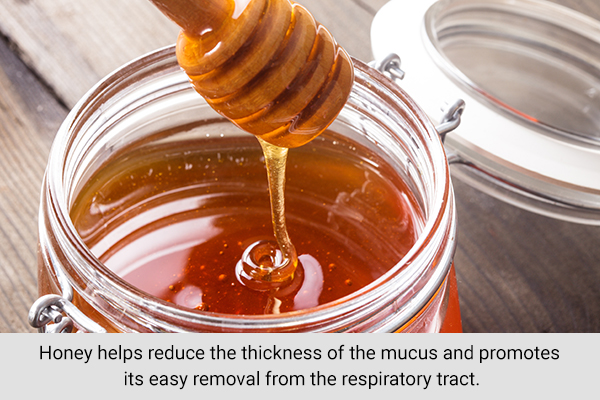
Honey is another well-known home remedy for cough. (6)
It helps reduce the thickness of the mucus and promotes its easy removal from the respiratory tract. Also, being high in antiviral and antibacterial properties, honey helps fight infection.
- Put 1 large organic onion (halved and thinly sliced) and 1 teaspoon of dried thyme (or 3 teaspoons of fresh thyme) in a glass, ceramic, or nonstick saucepan, and add enough honey to fully cover the ingredients (preferably 2 cups of raw local honey).
- Simmer over low heat for 1 hour, until the onion becomes juicy and soft.
- Pour the mixture into a glass jar, cover with a lid, and label. You can store this in the refrigerator for up to 1 month.
- Consume 1 tablespoon of this honey-thyme elixir daily during the cold season to prevent or treat a cold.
Note: Do not give honey to children under age 1 as it can lead to botulism.
4. Ginger works as a cough expectorant
Whether you are suffering from productive or non-productive cough, ginger is a good remedy.
As an expectorant, ginger helps in thinning and expelling mucus. It even reduces the intensity and duration of coughing bouts characterized by airway hyperresponsiveness and inflammation. (7)
Moreover, ginger has immune-boosting properties that help promote quick recovery.
How to use:
- Cut an inch of fresh ginger root into small slices and crush them a little. Put the ginger and 1½ cups of water in a pan and bring it to a boil. Let it simmer on low heat for another 5 minutes, then strain it. Drink this up to 3 times a day.
- Alternatively, mix together 1 tablespoon of freshly extracted ginger juice and 1 tablespoon of raw honey. Take this twice daily for a few days.
- You can also chew fresh raw ginger throughout the day.
5. Licorice can aid in relief
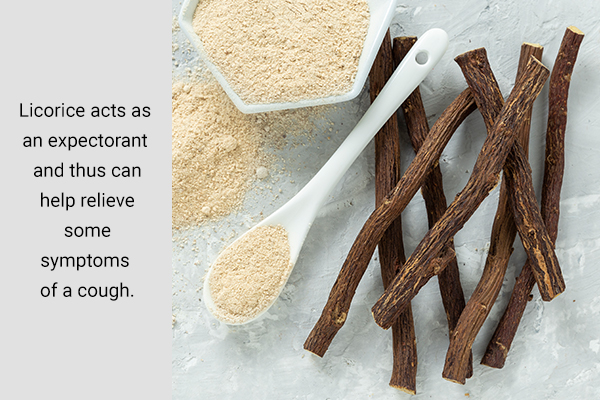
Licorice acts as an expectorant and thus can help relieve some symptoms of a cough. It also helps soothe a sore throat.
A 2017 study published in Bioorganic & Medicinal Chemistry highlights the antitussive and expectorant activities of licorice and its major compounds. (8)
How to use:
- Add ½ teaspoon of licorice root to 1 cup of hot water. Cover and allow it to steep for 5–10 minutes, and then strain. Add a little honey and drink this tea 2–3 times a day.
- Another option is to add ½ teaspoon of licorice powder and ½ teaspoon of dry ginger powder to 1 glass of hot water. Drink this 2 times a day.
- To soothe throat irritation, you can even suck on some licorice candies.
Note: Licorice remedies are not advisable for people with high blood pressure.
6. Use garlic
Garlic is also a good remedy for chesty cough. It acts as a natural expectorant, which helps provide quick relief from coughing.
Garlic also has immune-enhancing, (9) antibacterial, and antiviral properties that make it effective for clearing infection that may be the reason behind the cough.
How to use:
- Eat a clove of crushed garlic mixed with some honey 2–3 times a day.
- Add 1 tablespoon of chopped garlic to a pot of boiling water. Cover your head with a towel and inhale the vapor.
- You can also mix garlic oil with a little warm olive oil and use it as a chest rub.
7. Try using apple cider vinegar
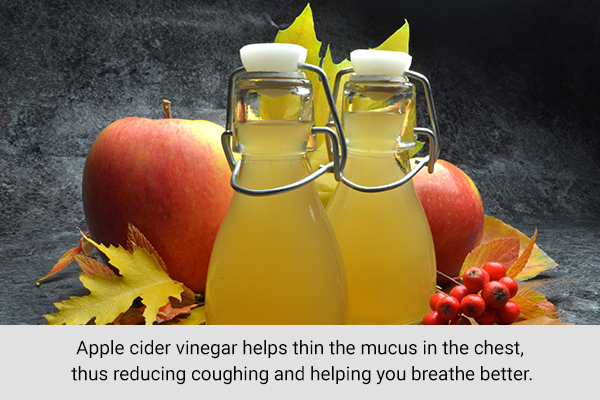
Apple cider vinegar is another effective remedy. (10)
Apple cider vinegar helps thin the mucus in the chest, thus reducing coughing and helping you breathe better. It even boosts your immunity, which greatly helps prevent cough in the first place.
How to use:
- Add 2 teaspoons of organic raw, unfiltered apple cider vinegar to 1 cup of lukewarm water. Mix in 1 teaspoon of raw honey and mix well. Drink this solution 2–3 times a day for a week.
- Mix ½ cup of raw, unfiltered apple cider vinegar with ½ cup water. Boil the mixture and remove it from the stove. Put a towel over your head and inhale the steam for 3–5 minutes through your nose with your mouth and eyes closed. Repeat a few times a day.
8. Blend and use pineapple juice, honey, ginger, cayenne, and salt
Another traditional cough remedy is to blend pineapple juice (11) with honey, ginger, salt, and a little cayenne pepper. The cayenne helps to expel the mucus, and honey and ginger soothe the throat. They also offer anti-inflammatory properties.
For this remedy, blend the following together:
- 1 cup pineapple juice
- 1 teaspoon minced or chopped ginger
- 1 tablespoon honey
- ¼ teaspoon cayenne pepper
- ¼ teaspoon salt
Drink ¼ cup of this blend up to 3 times per day.
Note: Do not give raw honey to children under 1 year of age.
How to Prevent Coughing

Although it cannot be completely avoided, there are certain steps you can take to ensure that you do not come down with a flu or cough. Here are some examples:
- Avoid getting in contact with others who are or might be sick.
- In case you are sick, avoid going to school or work, to prevent spreading the infection.
- Sneeze or cough with your nose and mouth covered.
- Increase your fluid intake to stay hydrated.
- Keep the common areas of your home or work clean.
- Always wash your hands, especially after coughing, eating, using the bathroom, or looking after someone who is sick.
- If your cough is due to allergy, then you can identify the allergen that affects you, and avoid exposure to them.
- One daily habit, that could prevent chest congestion, according to Dr. Janette Nesheiwat, is to, “stay hydrated – most important thing to do.”
Additional Tips to Manage Wet Cough

- Suck on cough drops or hard candies to soothe an irritated throat. However, don’t give these to small children due to the risk of choking.
- Drink lukewarm water, clear broth, warm lemon water, warm green tea, warm turmeric milk, and homemade chicken soup to soothe your throat and stay hydrated.
- Caffeine and alcohol can contribute to dehydration. Hence, avoid them.
- Use a humidifier when you are in a dry environment to prevent the mucus from becoming thicker. A humidifier adds moisture to the air, which can help thin the mucus and reduce the discomfort. But be sure to clean it regularly to prevent mold buildup.
- Avoid tobacco smoke. Smoking or breathing secondhand smoke can worsen your cough.
- While sleeping, elevate your head with extra pillows.
- You can use decongestant sprays to unblock your nose and ease your breathing.
- Include spicy foods in your diet as it can help thin mucus and make it easier to cough up.
- Foods rich in vitamin C can boost the body’s immune system.
- Avoid dairy, especially milk, as it could stimulate extra mucus production.
- Keep your room and surroundings clear of dust and bacteria that cause a buildup of mucus.
- Get enough sleep to keep your body strong to fight the infection and build your immunity.
When to See a Doctor
Usually, most coughs go away on their own. However, there may be times when you may need medical attention. Consult a doctor in the following cases:
- Your cough is becoming worse instead of better.
- You are unable to eat and breathe properly.
- You cough up blood.
- Any of the following symptoms accompany your cough: chills; fever higher than 101˚F (38˚C); dehydration; foul-smelling, thick, green-or yellow-tinted phlegm; and weakness.
- Your cough lasts more than 3 weeks.
- There are swollen glands on the side of your neck.
- You are also experiencing chest pain.
- You are losing weight for no apparent reason.
Final Word
There is little evidence for or against the effectiveness of over-the-counter (OTC) medicines for cough relief. (12) Fortunately, there are several natural remedies, like the ones mentioned above, that can help fight the root cause of the cough and provide quick relief from the symptoms.
- Was this article helpful?
- YES, THANKS!NOT REALLY



